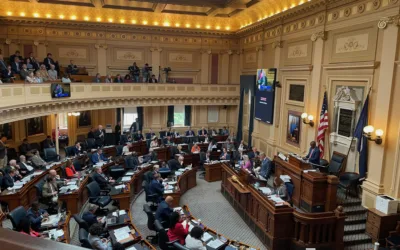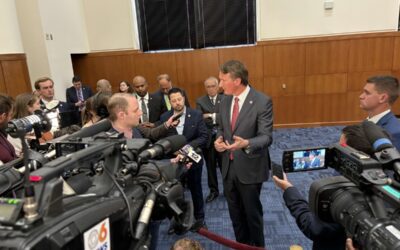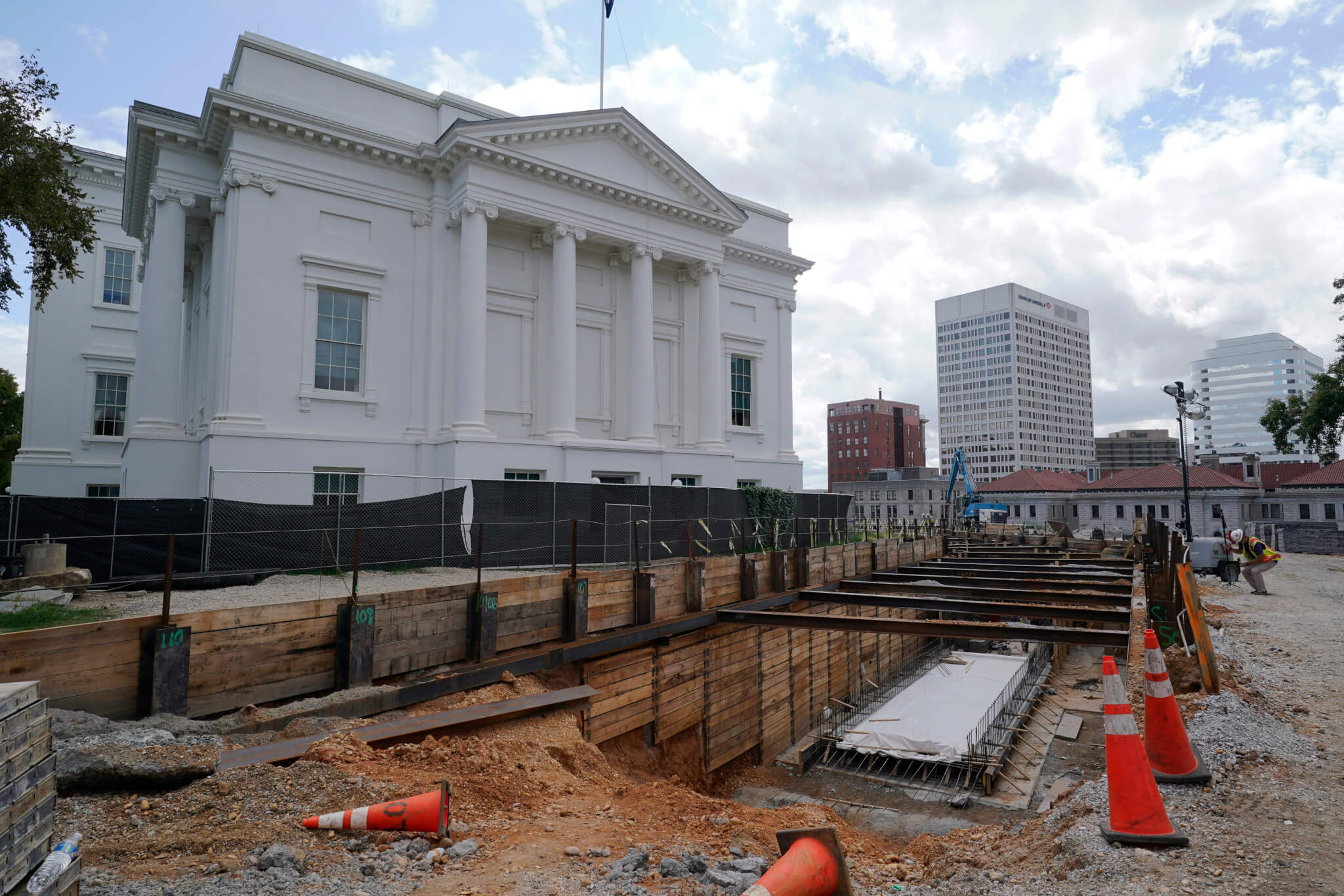
Work continues on the tunnel being dug between the new Virginia General Assembly building and the State Capitol Wednesday, Sep. 7, 2022, in Richmond, Va. (AP Photo/Steve Helber)
Virginia’s General Assembly has wrapped up its 45-day legislative session–among the briefest in the country! But what did lawmakers accomplish during that time, and how will it impact you?
From abortion to climate to education and LGBTQ issues, nearly 3,000 bills were introduced this year, but less than a third of those are on their way to becoming state law. That’s still almost 1,000 pieces of legislation, so here’s a rundown of what happened during the General Assembly session.
Education
Gov. Glenn Youngkin took advantage of far-right anger and conspiracy theories around public schools in 2021, and Republicans in the Legislature this campaign year followed suit, filing dozens of bills targeting schools and students and looking to restrict what gets taught.
Youngkin has continuously touted his “parent choice” agenda since taking office. Lawmakers such as Republication Del. Marie March latched onto this platform when they introduced a slew of bills that don’t actually do anything to improve education outcomes for Virginia’s kids.
One GOP proposal would effectively eliminate school vaccination requirements by allowing parents to opt out for any reason at all, thus endangering other children, and another sought to gut the powers of the state Board of Education, which is made up of appointees of multiple governors, and transfer its constitutional authority to the Superintendent of Public Instruction, placing the entire department under the thumb of a single sitting governor.
Another Republican measure – heavily backed by Youngkin – would have created “education savings accounts” to help parents pay for tuition and other costs associated with sending their children to private schools. However, those accounts would have been funded at the direct expense of Virginia’s public schools; the proposal would have diverted one-third of state funding appropriated for students into these ESAs. This proposal failed, so, while the state’s public education system won’t benefit from additional funding this year, at least it won’t suffer the massive cut that would have resulted from the passage of this measure.
Abortion
Despite the fact that most Virginians support reproductive freedom, Republicans spent this legislative session walking a tightrope between working to restrict abortion rights and avoiding recorded votes on the issue (after all, this is an election year, and all 140 seats in the legislature are on the ballot this fall).
House Speaker Todd Gilbert refused to allow some high-profile measures to go through the committee process, including Gov. Youngkin’s proposal to ban abortions after 15 weeks, to avoid forcing his fellow Republicans to vote on outright abortion bans. Instead, GOP lawmakers focused on passing a handful of “less ambitious” anti-abortion bills.
Democrats pushed to protect abortion rights with Senate Joint Resolution 255, which would protect the fundamental right to reproductive freedom in the state constitution and would protect against interference or discrimination in care. The constitutional amendment passed the Democratic-majority state Senate before dying in a special, GOP-skewed subcommittee in the Republican-controlled House.
Among the anti-reproductive rights bills that failed this year are measures that would establish that life begins at conception, making abortion illegal in the commonwealth and potentially impacting the ability of women to use the birth control method of their choice; allow pregnant drivers to count as two passengers for HOV/HOT lane purposes; and strip away provisions that authorize the use of state funds to pay for qualifying abortions in cases of rape, incest, and totally incapacitating physical deformities or mental deficiencies.
LGBTQ
Republican lawmakers pushed multiple bills that target LGBTQ Virginians. All of them failed, though some passed the GOP-controlled House.
One Senate measure would have prevented those under 18 years of age from receiving gender-affirming medical treatments. One House bill would have targeted and marginalized transgender kids who want to play school sports; another prohibited school board members and school board employees from changing a student’s name in any education record unless the request came alongside a court order.
Additionally, House Republicans killed a proposed amendment to the state constitution that would have repealed the (currently unenforceable) ban on same-sex marriage in the commonwealth.
Marijuana
In 2021, Virginia Democrats legalized marijuana, allowing adults 21 and older to possess an ounce or less and to grow limited amounts of cannabis themselves.
This session, a GOP-backed measure sought to alter crucial aspects of Virginia’s current law—which allows legal, adult-use cannabis possession and personal cultivation—by establishing a commercial marketplace and overriding equity guidelines prioritizing cannabis dispensary licenses for individuals and communities most affected by the state’s past marijuana prosecutions. Marijuana legalization advocates say his proposal would have benefited large corporations at the expense of people and communities harmed by decades of racist anti-marijuana policies. The measure failed, and commercial marijuana sales in Virginia remain in prohibition limbo.
Climate
In Virginia, climate isn’t just a topic of conversation around winter weather patterns. Climate conversations also include productive methods to help lower energy costs, address flooding, reduce pollution, and more.
Since 2020, the Commonwealth has participated in the Regional Greenhouse Gas Initiative (RGGI), which has made progress in reducing pollution from power plants, protecting public health, expanding clean energy, and addressing climate change, according to the Virginia League of Conservation Voters.
Despite being a part of this initiative, as the Virginia Mercury notes, the Virginia Republican Party “thinks the fight to preserve fossil fuel dependence is a winning issue.” In addition to the RGGI, the two other foundational bills of Virginia’s energy transition, the Virginia Clean Economy Act (VCEA) and Clean Cars, all came under attack this legislative session. However, none of the bills targeting these initiatives passed.
In the transportation sector, seven bills were introduced by Republican lawmakers aimed at repealing the Air Pollution Control Board’s authority to implement the Advanced Clean Car Standard: House Bill 1372, House Bill 1378, Senate Bill 778, Senate Bill 779, Senate Bill 781, Senate Bill 782, and Senate Bill 785. These bills were all killed in committee.
Two important pro-environmental bills did pass, however: Senate Bill 1323 and Senate Bill 1441. The first, introduced by Democratic now-former Sen. (and US Rep.-elect) Jennifer McClellan, requires the SCC to establish energy-saving targets for Dominion Energy Virginia, specifically for those who are low-income, elderly, disabled, or veterans of military service. The second, SB 1441, moves up the VCEA’s deadline for offshore wind farm construction from 2034 to 2024. This sounds good in theory, but as of publication, the current timeline calls for completion of the Coastal Virginia Offshore Wind Project (CVOW) in 2026.
However, the bill would also require that when Dominion seeks cost recovery, it must give preference “for generating facilities utilizing energy derived from offshore wind that maximize economic benefits to the commonwealth, such as benefits arising from the construction and operation of such facilities and the manufacture of wind turbine generator components.”
Guns
This legislative session, the Democratic-majority Virginia Senate passed several gun safety bills, while Republicans in the House of Delegates not only killed them, but they attempted to pass their own set of bills aimed at making it easier to obtain and carry firearms; these measures met their end in the Senate.
Among the commonsense gun safety bills killed by Republicans are Senate Bill 1139, which would have required firearms and ammunition kept in homes with minors to be locked in containers that those minors do not have access to; Senate Bill 1067, which would have strengthened the state’s “red flag” law, which temporarily removes guns from the possession of those deemed a danger to themselves or others; and Senate Bill 901, would have required anyone leaving a handgun in an empty car to merely lock the car.
Among the anti-gun safety measures that died in the state Senate are House Bill 1407, which would have allowed anyone with a concealed handgun permit to carry a weapon or an explosive device into Richmond’s Capitol Square or in other state buildings; House Bill 1427, which would have banned counties, cities, or towns from enact their own local restrictions on firearms in parks and other public spaces; and House Bill 1871, which would have extended the life of concealed carry permits from five years to 10 years.
All of these gun-related bills were considered in the context of several horrific shooting incidents that have happened in the state in the past several months.
Who are your state legislators? Click here to find out!
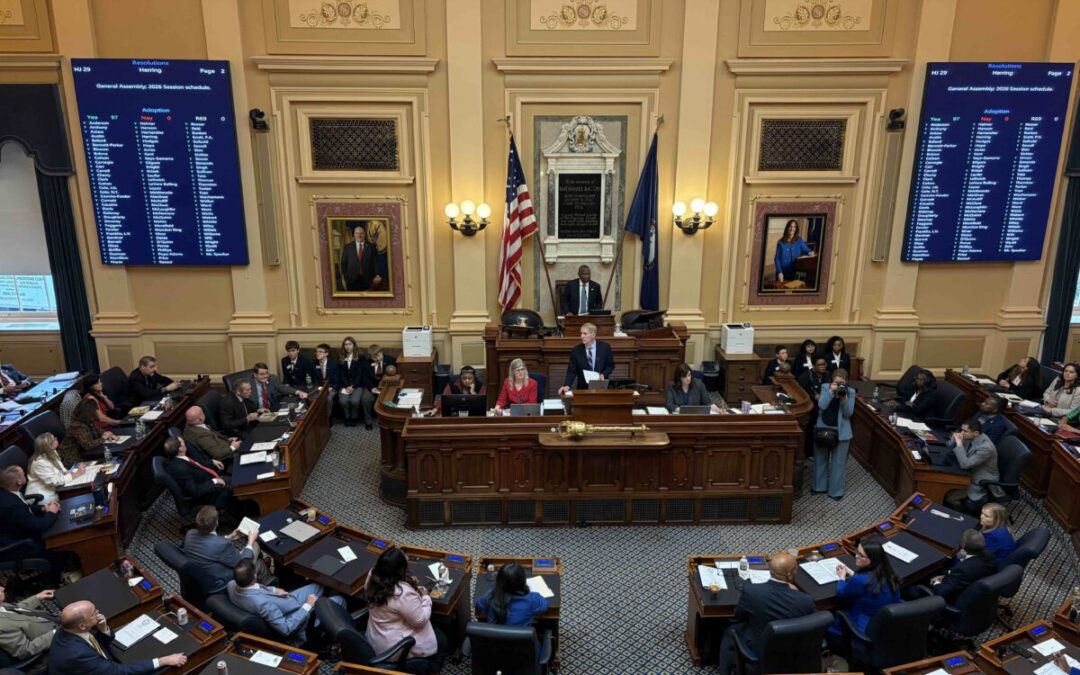
Virginia House Democrats advance four constitutional amendments
The Virginia House of Delegates advanced four constitutional amendments dealing with abortion rights, gay marriage, voting rights, and...

Spanberger, Dem leaders release ‘Affordable Virginia Agenda’
Gov.-elect Abigail Spanberger released a list of bills and proposals she supports to lower the cost of health care, energy, and housing in Virginia....

Progressive Dem eyes Virginia congressional bid amid possible redistricting
State Del. Sam Rasoul of Roanoke says he supports Medicare for All, a Green New Deal, and an end to US military support for Israel. In the wake of...
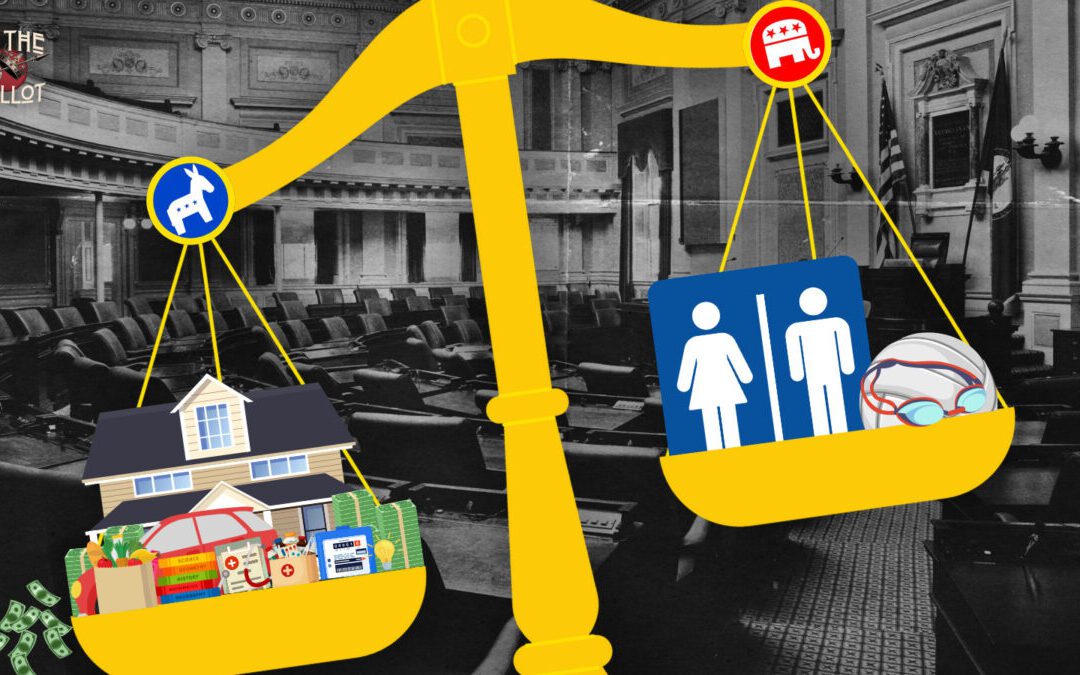
Commentary: The costs of being in the majority
Democrats won on issues of affordability and working-class concerns. Now it’s time to deliver. Governor-elect Abigail Spanberger and Virginia...

Meta’s ‘teen safety’ tools are failing Virginia kids—and Gov. Glenn Youngkin isn’t helping
Parents and cybersecurity experts want Virginia lawmakers to hold companies like Meta accountable when their platforms fail to keep their pledges to...

‘Ticket to Ride’ and pickle sandwiches: The family life behind Abigail Spanberger’s campaign
Remember the viral victory speech with the toddler under the podium? That kid’s mom could be Virginia’s next governor. On Nov. 4, Democratic...



